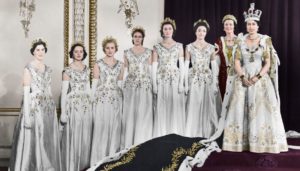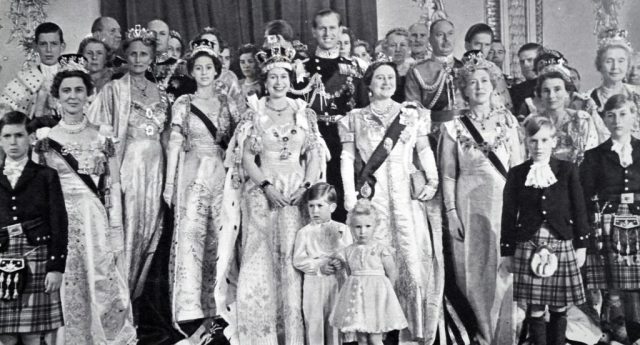A lot like a wedding: the coronation of Elizabeth II. Credit: Universal History Archive/Universal Images Group via Getty Images)

‘Coronation Maids’, on BBC Radio 4 this week, was an absolute delight. It brought together five of the six women who were the Queen’s young maids of honour at her coronation. And no, I didn’t know she had them either. In the plumiest of tones, the Queen’s maids recounted some fabulous little anecdotes concerning the preparation for the coronation service — of the meticulousness of the master of ceremonies, the 16th Duke of Norfolk, Bernard Marmaduke Fitzalen-Howard; of the grumpiness of the Archbishop of Canterbury, Geoffrey Fisher, who surprised them all by producing a bottle of brandy from under his robes, of how much they all enjoyed having Coronation Chicken for the first time back at the Palace after the ceremony.
The programme, part of Sue MacGregor’s Reunion series, brought home how much like a wedding the whole thing was. The Coronation ring, placed on the fourth finger of her right hand, is also known as “The wedding ring of England”. It is a union of sorts, being struck between the Queen and her subjects. And back in 1952, both sides enthusiastically consented. The Pathé newsreel of the time spoke of “The happy heartbeat of the cockney crowd. London is royal and gay.”

It’s not just our language that has radically changed since then. The aristocracy is no longer treated with deference, the Church of England has been substantially abandoned, Coronation is a street in Manchester, and Coronation Chicken has becomer retro at best, and an embarrassing empire hangover at worst. Which raises the question: are the British people ready to get married again, and to get married like this?
This is not an academic question. The Queen was 94 this week. And the presence of Covid-19 within the palace walls was a reminder of her mortality. The Queen retains the love and admiration of her people — but what on earth would 21st-century Britain make of the Coronation service itself. It’s a ceremony that exposes in liturgical form the nature of the British state, and, in particular, its intimate relationship to God?
At the beginning of the service, the archbishop asks the people present of they are “willing” to “do homage and service”? As Archbishop Charles Le Grice preached in 1821 on the day of George VI’s coronation:
“The solemn ceremony of this day is not the pageant of a Monarch receiving the homage of his vassals; it is not the triumph of despotic power …. The poorest subject is a party to the covenant which the King now makes.”
In other words, consent is vital to the delicate constitution balance as played out in the coronation. Indeed, it is even there in the National Anthem itself: “May she defend our laws, and ever give us cause, to sing with heart and voice, God save the Queen.” (Not that everybody knows that verse.) But here we sing of the hope that the monarch will always give us a good reason to defend her; subtly suggesting, of course, that if she doesn’t, we won’t.
How will the congregation react to the next coronation? Not so much the hand-picked thousands in Westminster Abbey, but the wider congregation at home. I doubt they will dress up in their Sunday best, as they did last time, and hang on every detail of a three-hour church service. But will they even understand what is going on? Will the deliberately Christian nature of the service be alienating in a post-religious and multi-cultural society? Will the plummy accents of the lords and ladies in waiting feel like the sound of another age, as if we are being secretly governed by some occupying power?
Understanding the symbolism of the service itself — the emphasis on anointing, for instance, and its origins in the Hebrew scriptures — requires a level of theological literacy that has been largely lost. Will the puzzled onlookers be like awkward guests at a wedding who feel uncomfortable in church, itchy in their hired suits, who don’t know the hymns, stumble over the words, and who snigger during the prayers?
That sort of thing might not matter so much at the wedding of someone else. But at the coronation, “the People” themselves have to say “I do”. And it’s been so long since the last coronation, I wonder if we will understand that we too have a part to play in the ceremony.
I ask these questions nervously. The coronation may only be an ‘ornamental’ aspect of our constitution. But I do worry that any interference in the complex dynamic of informed consent that the monarch and the people are believed to express to each other through the coronation could have unknown consequences for our historic constitutional arrangements. Brexit challenged us with a number of constitutional questions that we were not expecting. Helen Thompson, Professor of politics at Cambridge, thinks that the death of the Queen could well do the same. It could precipitate a constitutional crisis for which we are ill prepared.
Republicanism is not especially strong on these islands — but when the leader of a major political party (Nicola Sturgeon) reacts to the Prince Andrew/Jeffrey Epstein scandal with the comment “I think there is a debate to be had about the longer term future of the monarch”, you just know that the death of the Queen is going to be a moment of opportunity for those who want radically to reshape our constitution. Especially with brand Archwell — more Beckingham than Buckingham — continuing to chip away at the mystique that royalty requires to successfully operate.
Part of the problem in answering the Republican challenge is that it’s not straightforward to say what the monarchy achieves for the British constitution. Even the Queen herself has described it as “a puzzle” and “always will be”. There were times, before dreary things like evidence based policy, when you could have got away with this sort of answer. To this extent, royalty and divinity do have something important common: they don’t readily give up their advantages to empirical scrutiny.
Perhaps I am fussing unnecessarily. Patriotism in these islands is on the up, and affection for the Queen herself, and indeed for the Prince of Wales, is probably as high as ever. Her Majesty has had an especially good Covid crisis — her broadcast on Palm Sunday was well received a home and across the globe. At a time of crisis like this, where death has come amongst us so visibly, our connection as a nation to our past, our continuity over time and symbolic links to each other, feels especially important.
In this midst of this, William and Kate are quietly getting on with the business of working out how to preserve the best of the Queen’s legacy. Even the relationship of England with Scotland — currently the weakest link in our constitutional settlement — hasn’t seen anything like the stresses and strains that other political unions, the European Union and the United States, have experienced in response to this virus.
But nonetheless, as we approach the end of the Queen’s reign, a moment of nervousness is not inappropriate — us getting ever closer to a moment where one wrong move could give us “President Blair” or some other similar indignity.
Over in the United States, they now have an elected official who behaves like the worst sort of dominating monarch. “When somebody is the president of the United States, the authority is total”, Trump recently boasted. By contrast, here in the United Kingdom we have a monarchy that, for those who can see past the pomp and the diamonds, goes in for quiet dignity and servant leadership. And long may that continue.
Happy St George’s day. And Vivat Regina.










Join the discussion
Join like minded readers that support our journalism by becoming a paid subscriber
To join the discussion in the comments, become a paid subscriber.
Join like minded readers that support our journalism, read unlimited articles and enjoy other subscriber-only benefits.
Subscribe